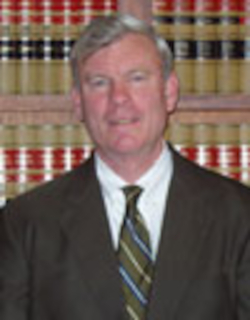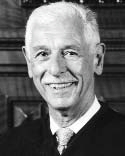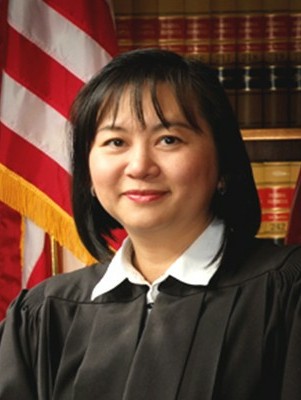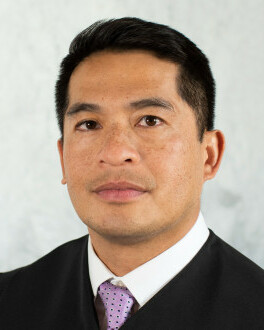Related Research Articles
James Earl Duffy Jr. is a retired associate justice of the Hawaii State Supreme Court. He served on the court from 2003 to 2013. He also is a former federal judicial nominee to the U.S. Court of Appeals for the Ninth Circuit.
Miguel Angel Estrada Castañeda is a Honduran-American attorney who became embroiled in controversy following his 2001 nomination by President George W. Bush to the United States Court of Appeals for the District of Columbia Circuit. Senate Democrats, unable to block his nomination in the Senate Judiciary Committee after the Republican Party took control of the U.S. Senate in 2002, used a filibuster for the first time to prevent his nomination from being given a final confirmation vote by the full Senate.

Richard Allen Griffin is a United States circuit judge of the United States Court of Appeals for the Sixth Circuit. Previously, he was a judge on the Michigan Court of Appeals.

David William McKeague is a senior United States circuit judge of the United States Court of Appeals for the Sixth Circuit.

Terrence William Boyle is a United States district judge of the United States District Court for the Eastern District of North Carolina. He was chief judge of that court from 1997 to 2004. He served a second term as chief judge from 2018 to 2021. From 1991 to 1993 and again from 2001 to 2007, he was a nominee to the United States Court of Appeals for the Fourth Circuit. His federal appellate nomination from 2001 to 2007 is the longest in history not to be acted upon by the United States Senate.

Carlos Tiburcio Bea is a Spanish-born American judge and lawyer. He is a senior United States circuit judge of the United States Court of Appeals for the Ninth Circuit. He was appointed to that court by President George W. Bush in 2003 to replace Judge Charles Edward Wiggins.

Leslie Harburd Southwick is a United States circuit judge of the United States Court of Appeals for the Fifth Circuit and a former judge of the Mississippi Court of Appeals.

Norman Randy Smith is a senior United States circuit judge of the United States Court of Appeals for the Ninth Circuit. He lives and maintains chambers in Pocatello, Idaho.

Susan Bieke Neilson was a United States circuit judge of the United States Court of Appeals for the Sixth Circuit, and before that, a state trial judge in Michigan.
Helene N. White is a senior United States circuit judge of the United States Court of Appeals for the Sixth Circuit. Previously, she was a judge on the Michigan Court of Appeals.
During President Bill Clinton's first and second terms of office, he nominated 24 people for 20 federal appellate judgeships but the nominees were not processed by the Republican-controlled Senate Judiciary Committee. Three of the nominees who were not processed were nominated after July 1, 2000, the traditional start date of the unofficial Thurmond Rule during a presidential election year. Democrats claim that Senate Republicans of the 106th Congress purposely tried to keep open particular judgeships as a political maneuver to allow a future Republican president to fill them. Of the 20 seats in question, four were eventually filled with different Clinton nominees, fourteen were later filled with Republican nominees by President George W. Bush and two continued to stay open during Bush's presidency. Senator Harry Reid, the Democratic leader of the United States Senate during the 110th Congress, and Senator Patrick Leahy, the Democratic leader of the Senate Judiciary Committee under Reid, repeatedly mentioned the controversy over President Clinton's court of appeals nominees during the controversy involving the confirmation of Republican court of appeals nominees during the last two years of Bush's second term. Republicans claimed that Democrats were refusing to confirm certain longstanding Bush nominees in order to allow a future Democratic president in 2009 to fill those judgeships.
During President George W. Bush's two term tenure in office, a few of his nominations for federal judgeships were blocked by the Senate Democrats either directly in the Senate Judiciary Committee or on the full Senate floor in various procedural moves, including the first use of a filibuster to block a Federal Appeals Court nominee. Republicans labeled it an unwarranted obstruction of professionally qualified judicial nominees.
Carolyn Barbara Kuhl is a judge on the Superior Court of California for the County of Los Angeles and a former nominee to the United States Court of Appeals for the Ninth Circuit. She became a Superior Court judge in 1995 and was nominated to a seat on the United States Court of Appeals for the Ninth Circuit on June 22, 2001, by President George W. Bush.
James Arthur Beaty Jr. is a former United States district judge of the United States District Court for the Middle District of North Carolina, and a former nominee to the United States Court of Appeals for the Fourth Circuit.

Jacqueline Hong-Ngoc Nguyen is an American lawyer who serves as a United States circuit judge of the United States Court of Appeals for the Ninth Circuit. She previously served as a United States district judge of the United States District Court for the Central District of California from 2009 to 2012 and as a California superior court judge from 2002 to 2009.

Lucy Haeran Koh is an American lawyer serving as a United States circuit judge of the United States Court of Appeals for the Ninth Circuit. Koh previously served as a United States district judge of the United States District Court for the Northern District of California from 2010 to 2021. She also served as a California state court judge of the Santa Clara County Superior Court from 2008 to 2010. She is the first Korean American woman to serve on a federal appellate court in the United States.
Donald Trump, President of the United States from 2017 to 2021, entered office with a significant number of judicial vacancies, including a Supreme Court vacancy due to the death of Antonin Scalia in February 2016. During the first eight months of his presidency, he nominated approximately 50 judges, a significantly higher number than any other recent president had made by that point in his presidency. By June 24, 2020, 200 of his Article III nominees had been confirmed by the United States Senate. According to multiple media outlets, Trump significantly impacted the composition of the Supreme Court and lower courts during his tenure.

Patrick Joseph Bumatay is an American lawyer and jurist who serves as a U.S. circuit judge of the U.S. Court of Appeals for the Ninth Circuit.

Kenneth Kiyul Lee is a South Korean-born American lawyer who serves as a United States circuit judge of the United States Court of Appeals for the Ninth Circuit.

Daniel Paul Collins is a United States circuit judge of the United States Court of Appeals for the Ninth Circuit.
References
- 1 2 3 http://governor.ca.gov/state/govsite/gov_htmlprint.jsp?BV_SessionID=@@@@0093756379.1230686606@@@@&BV_EngineID=ccccadegdidkejicfngcfkmdffidfnf.0&iOID=53122&sSubCat=null&sCatTitle=Press+Release&sTitle=GOVERNOR+DAVIS+ANNOUNCES+APPOINTMENT+TO+CONTRA+COSTA+COUNTY+COURT+11%2F11%2F2003&sFilePath=%2Fgovsite%2Fpress_release%2F2003_11%2F20031111_A03335_BARRY_GOODE.html%5B%5D
- 1 2 End of the Month Archived September 5, 2008, at the Wayback Machine
- ↑ Statement of Senator Dianne Feinstein "On Changing Practices for Judicial Nominations"
- ↑ Bush Dumps Clinton Nominees, 62 Executive And Judicial Nominees Are Pulled... - CBS News
- ↑ "Judges of the United States Courts". Archived from the original on 2009-01-18. Retrieved 2008-12-03.
- ↑ Calif Oracle set to nix license deal Archived March 21, 2006, at the Wayback Machine
- ↑ How energy giant tried to cut a deal / Duke Inc. offered to reduce bill if state halted probes
- ↑ Sacramento Bee - California Insider Archived 2008-05-04 at the Wayback Machine